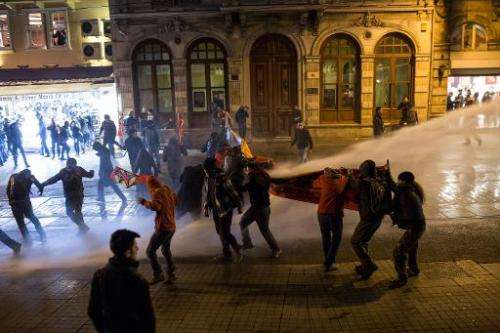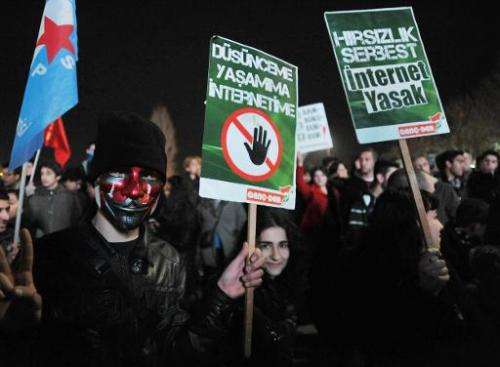'Orwellian' Internet curbs go before Turkish parliament

Turkish MPs will debate Wednesday new Internet legislation portrayed by the government as shielding the young from dangerous material but which critics say is a further erosion of personal freedom in the aspiring EU member.
The proposals follow reforms that detractors say hurt the independence of the judiciary and come as Prime Minister Recep Tayyip Erdogan tries to contain a deeply damaging corruption probe implicating his inner circle.
Turks' ability to go online is already far from free, activists say, with thousands of websites blocked in recent years. It makes a comparatively huge number of requests to block online content, Google data show.
YouTube was unavailable for two years until 2010 because of material deemed insulting to modern Turkey's still-revered founder Mustafa Kemal Ataturk, while fellow video-sharing website Vimeo became off-limits only last month.
But the new measures go further, allowing authorities to keep a record of someone's Internet activity for up to two years, including Google searches and interactions on social networks like Facebook.
The most disturbing component, says Yaman Akdeniz, law professor at Bilgi private university in Istanbul, is "Orwellian" new powers for the Telecommunications Communications Presidency (TIB).
This authority will be able to request and collect communications and traffic data from hosting and service providers—without a court order or a justified reason, Akdeniz told AFP.
In the same way, the head of the TIB can block any website deemed to have infringed someone's privacy or be discriminatory or insulting, or to protect young people from unsuitable content.

"Turkey is certainly moving towards a more restrictive policy which includes mass surveillance measures on all Internet users," Akdeniz said.
"More blocking and more control measures will move Turkey away from the European Union in terms of Internet policy, perhaps a few steps closer to China."
The proposals have been widely criticised both at home and abroad, with the European Union, the US State Department and the Council of Europe expressing misgivings.
Reporters Without Borders says the aim is "to reinforce cyber-censorship, government control of the Internet and surveillance of the public".
Turkish Bar Association (TBB) president Metin Feyzioglu says the proposals, contained in a so-called omnibus bill also comprising other measures, might "adversely affect Turkey's world ranking in terms of democracy".
The US-based Committee to Protect Journalists, which says the changes will make investigative journalism much more difficult, calls it a "slide into Internet authoritarianism".
The Islamic-rooted government, in power since 2002, rejects this, with Deputy Prime Minister Bulent Arinc saying there is "no such thing as Internet censorship. We are freer compared to many other countries and have freedom of press."

Awkward questions
Erdogan, Turkey's all-powerful leader since 2003, is openly suspicious of the Internet, branding Twitter a "menace" for helping organise mass nationwide protests in June in which six people died and thousands were hurt.
For critics, last week gave a taste of things to come when Umut Oran, deputy leader of the opposition Republican People's Party (CHP), was told by the TIB to remove from his website a parliamentary question he had asked.
The question, which media were also told to not report on, was close to the bone for Erdogan, asking about purported recordings of dodgy-sounding phone calls involving the prime minister, his son and a minister.
The TIB attempted to backtrack, calling the order an "error", but the damage was done.
"On orders from the prime minister, is the TİB going to clean up corruption motions on parliament's website?" said Oran. "We are not going to surrender to censorship."
© 2014 AFP



















